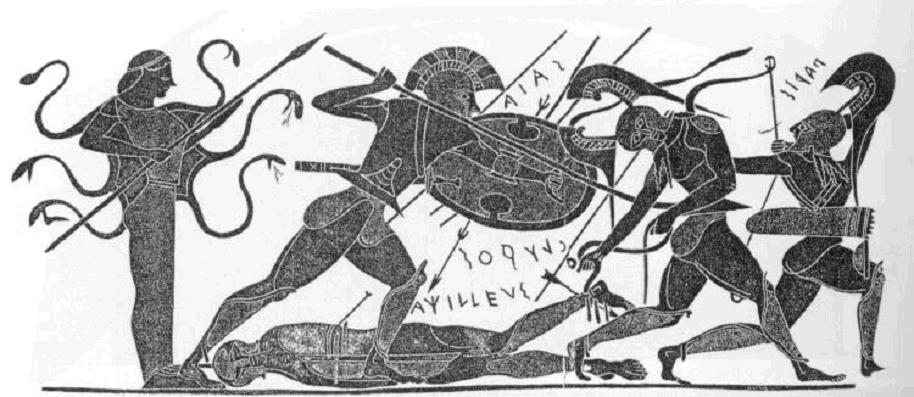

Achilles was the son of Peleus, king of Phthia, and Thetis, a sea nymph. When Achilles was born, Thetis, wanting to protect him from all harm, held him by his left heel and dipped him in the river Styx. Because of that, Achilles’ left heel was unprotected and was his only physical vulnerability. That, of course, is only one version of the story.
As the protagonist in Homer’s epic tale, The Iliad, Achilles was one of the chief heroes of the Trojan War. He was noted for having killed the Trojan prince, Hector. But Achilles met his match when Paris Marriott (not Paris Hilton) shot him in the left heel with an arrow.

Supposedly, Achilles killed Penthesilea, Queen of the Amazon, which I consider to be truly a shame. After Achilles was killed, the heroes Odysseus and Ajax supposedly fought for Achilles’ armor, with Odysseus winning and giving the armor to Achilles’ son, Achilles II, or “Junior” for short. After his defeat, Ajax came to Oxford and opened a baklava stand next door to Pyramid Scrolls, across from the Lafayette Covnty Covrt Hovse. Ajax eventvally moved across the Sqvare after complaints from Pyramid Scrolls about cvustomers having sticky fingers as they rolled throvgth the scrolls. Pyramid Scrolls then expanded with three other stores: Trapezoid Scrolls, Rhombvs Scrolls, and Isosceles Scrolls.
Unbeknownst to most, Achilles had a twin brother, Beechilles. When they were born, Achilles came out first, followed immediately by Beechilles, who had a firm grasp on Achilles’ left heel. Thetis gave birth on the banks of the river Styx. She could have positioned herself better, but, given the fact that she was in the painful throes of childbirth, I think she should get a pass on that.
The force of Achilles and Beechilles expellation from the womb flung Achilles into the river Styx and would have done the same to Beechilles had not the fast-acting Thetis grabbed Beechilles legs, thus saving the twins but leaving Achilles as the only one who had been baptized, and Beechilles as the hanger-on.
Now, Achilles and Beechilles—known throughout Greece as the Chilles Twins—were, as in birth, pretty much inseparable. They could and did pass for each other through many an escapade. But since Beechilles didn’t get dunked in the river Styx, he was the one who always got the blame for the antics, most of which were initiated by Achilles. Thus, Beechilles was given the disparaging nickname “Achilles’ Heel.”
In his arrogance, Achilles took to calling Beechilles “Heel,” thus planting the seeds of bitterness in Beechilles. As time passed, the Duke Boys of ancient Greece grew apart. When war broke out in Troy, Achilles set out to win the battle and forced Beechilles to be his armor-bearer. Beechilles had had enough. When approached by Paris Marriott, Beechilles was more than willing to tell him about big brother Achilles’ heel. And, as noted earlier, Paris Marriott was able to kill Achilles with an arrow to the left heel.
Though suspected of betrayal, no one could ever prove Beechilles’ guilt. Greek society turned its back on him, and Beechilles was forced to roam the countryside in search of food and shelter. At one point he mustered a bit of success as a dancing minstrel under the name “River Styx,” but when his true identity was revealed, he had no choice but to sail away to Obscurity, a small island off the coast of Greece, with his lady.
The sagas of great people with a weakness that sometimes leads to their downfall is everywhere in literature and film. Even Superman has his kryptonite. But most often the fatal flaw comes in the form of things like greed, lust, popularity, arrogance, and a thirst for power. Sometimes the Achilles heel is a compensation for a deficiency denied or covered up. For the wise, though, owning up to our weaknesses can be the beginning of winning over them, as with the addicted who embrace the first of The Twelve Steps, “We admitted we were powerless over alcohol—that our lives had become unmanageable.” Who knows? If Achilles had worn sandals with a thick heel, he might have lived to harass Beechilles another day.
Folks, let’s not play like. This Coronavirus thing ain’t mythological, and it ain’t over by a long shot. We all want to be out and about. But our Achilles’ heel could be a combination of arrogance, impatience, and ignorance with an unhealthy dose of indifference thrown in. That’s one recipe nobody needs to be cooking up right now. Let’s still be careful out there.
…and that’s the view from The Balcony.



